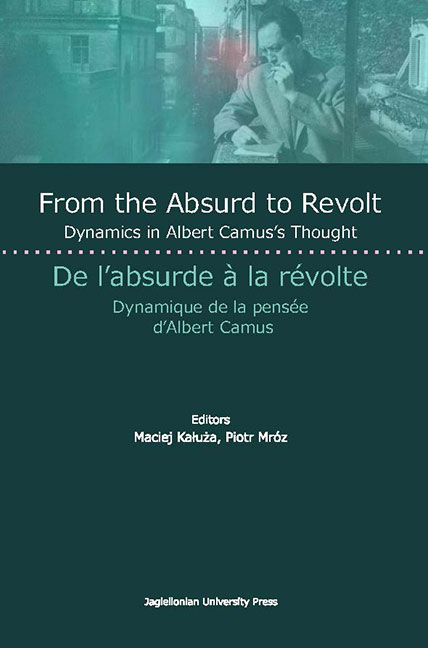Book contents
- Frontmatter
- Contents
- Introduction
- Part One From the Absurd to Revolt, Analysis of Sources for Camusian Concept of Revolt
- Profound Indifference: The Source of Revolt in the Early Writings of Camus
- Un personnage emblématique : Caligula, ou la pensée en action de l'absurde à la révolte
- La Peste, de l'absurde à la révolte : les limites de l'engagement
- Camus’ Religious Revolt in The Plague
- Lire et écouter pour écrire L'Homme révolté
- The Dynamics in Meaning of Absurdity and Revolt: between La liberté absurde and L'absurde et le meurtre
- Part Two Camus's Revolt in Contemporary Analysis
- Part Three Camus's Revolt in Comparatistic Studies
The Dynamics in Meaning of Absurdity and Revolt: between La liberté absurde and L'absurde et le meurtre
from Part One - From the Absurd to Revolt, Analysis of Sources for Camusian Concept of Revolt
Published online by Cambridge University Press: 22 December 2017
- Frontmatter
- Contents
- Introduction
- Part One From the Absurd to Revolt, Analysis of Sources for Camusian Concept of Revolt
- Profound Indifference: The Source of Revolt in the Early Writings of Camus
- Un personnage emblématique : Caligula, ou la pensée en action de l'absurde à la révolte
- La Peste, de l'absurde à la révolte : les limites de l'engagement
- Camus’ Religious Revolt in The Plague
- Lire et écouter pour écrire L'Homme révolté
- The Dynamics in Meaning of Absurdity and Revolt: between La liberté absurde and L'absurde et le meurtre
- Part Two Camus's Revolt in Contemporary Analysis
- Part Three Camus's Revolt in Comparatistic Studies
Summary
INTRODUCTION
Both major philosophical works of Albert Camus, Le mythe de Sisyphe (1942; Myth of Sisyphus; hereafter Ms) and L'homme Révolté (1951; The Rebel; hereafter HR), relate to the themes of absurdity and revolt. in this paper, i focus on the absurd-revolt relation in two crucial moments of Camus's argumentation, showing the initial influence of the experience of absurdity on his concept of rebellion, as presented in La liberté absurde (1942; Absurd freedom), part of his first essay. Consequently, i relate to the undertaking of these exact notions as presented in L'absurde et le meurtre (1949; Murder and the absurd), which consequently became the introduction to HR. i also try to address the issue of the development of Camus's ideas that occurred in the meantime. This reference to the sources that appeared between these two philosophical texts is, i believe, necessary in order to understand the origin and direction of the absurd-revolt dynamics. in the philosophical scholarship on Camus, it is common to see a tendency to omit almost everything that led him to write the introduction of 1949, making his analysis of the absurd in the context of murder, which introduces the problem of revolt, seem to be a direct continuation (or departure from) of his thought from 1942. As i am convinced of the importance of some remarks that Camus made in the intervening period, my analysis cannot be complete without at least a brief mention of several texts that appeared between the publication of Ms and HR. My preference - applied in this paper - for understanding the progression of Camus's thinking in a broader context of his works, essays, correspondence and notes (which i try to develop in my book, of which this paper may be considered a brief summary) is based on my strong preference for a hermeneutical and developmental approach.
THE ABSURD AND REVOLT IN LA UBERTE ABSURD
In the concluding section of his famous essay La liberté absurde in Ms, Camus describes his proposition for living, given the problem of absurdity, as defined and understood in previous parts of the essay.
- Type
- Chapter
- Information
- From the Absurd to Revolt/De l'absurde a la Revolte , pp. 97 - 118Publisher: Jagiellonian University PressPrint publication year: 2017



